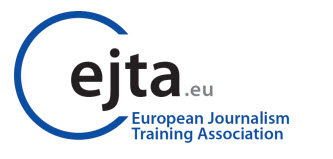8 December 2020 – Over 100 fact-checks, and counting, are available on the EUfactcheck.eu website.This EJTA-project kicked off in 2016 to supports journalism education all over Europe and aims to foster fact-based public debate.
Over 33 journalism schools from 24 countries are involved in the EUfactcheck project and regularly publish their student production on the website. After a successful 2019 edition, which covered the EU elections, the site tripled the number of visitors this spring.
The theme of the 2020 edition is ‘European politics, policies and contexts’. This is broader than the specific EU theme in the period before the Parliamentary Elections in 2019. The project doesn’t focus on national themes or contexts but students check claims or statements that have cross-national, pan-European impact.
New insights
The project is an ongoing success. The site has a run rate of 200 visitors per day. In the last three months, the number of visitors has tripled up to 58 000.
Also the students of the participating schools are enthusiastic and gather new insights in their future job. “In times of information overload, it is good to learn how to select what is important and what is correct”, says one student. “It is interesting to see how some politicians construct a false reality out of correct bits of information”, adds another one.
Monitoring media
EUfactcheck takes another course during the corona crisis because the participating schools want to safeguard the journalistic and methodological quality of the published fact checks. Times are strange and unpredictable now, with governmental regulations straining the work of journalists, with media dealing with changing truths from one hour to the next, with the undefeatable speed of social media countering false claims and statements, with difficulties for students of journalism to contact experts.
The educational core of the project and the intensive coaching of students are also influenced by the closure of universities all over Europe and restrictions on information.
That’s why the journalism students will not focus specifically on debunking claims on corona. They will publish blog posts about the media approaches and monitor how journalism is handling this changed reality in Europe and beyond. If the circumstances allow it, students can choose to check news on corona.
Handbook
Coordinator Nadia Vissers and the steering committee of the project published a handbook. “We wanted to tell the story of the project”, says project coordinator Nadia Vissers. “And we want to share our lessons learned with everyone who has plans to set up a multinational project. Moreover, it helps educators who want to include a module on fact checking in their curriculum.”
From Finland to Italy, from Spain to Russia
The participating schools come from Austria, Belgium, Croatia, Denmark, Finland, France, Georgia, Germany, Greece, Italy, The Netherlands, Russia, Spain and Sweden. And the EUfactcheck project welcomes new participants from Bulgaria, Czech Republic, Georgia, Macedonia, Montenegro, Poland, Romania, Serbia, Slovakia, Slovenia and Ukraine. All journalism schools publishing on the site are member of the European Journalism Training Association (EJTA), that groups about eighty journalism centres, schools and universities from about thirty countries across Europe. With the project EJTA wants the journalism students to grow a deeper insight and interest in democratic processes by enhancing their media literacy and as such developing both critical understanding of the media and active participation in the media. In this way the quality of journalism and journalism education will be improved and at the same time EUfactcheck contributes to a better fact-based public debate.
EJTA members work together to improve journalism education in Europe, enabling members to collaborate on exchanges and teaching and research projects, and meet regularly to exchange ideas and information.
More Information
Project website
Instagram: eufactcheck
Twitter: @EUfactcheckEU
Facebook: eufactcheck.eu
Downloadlink handbook
Nadia Vissers
EJTA board member
programme coordinator EUfactcheck
nadia.vissers@ap.be

